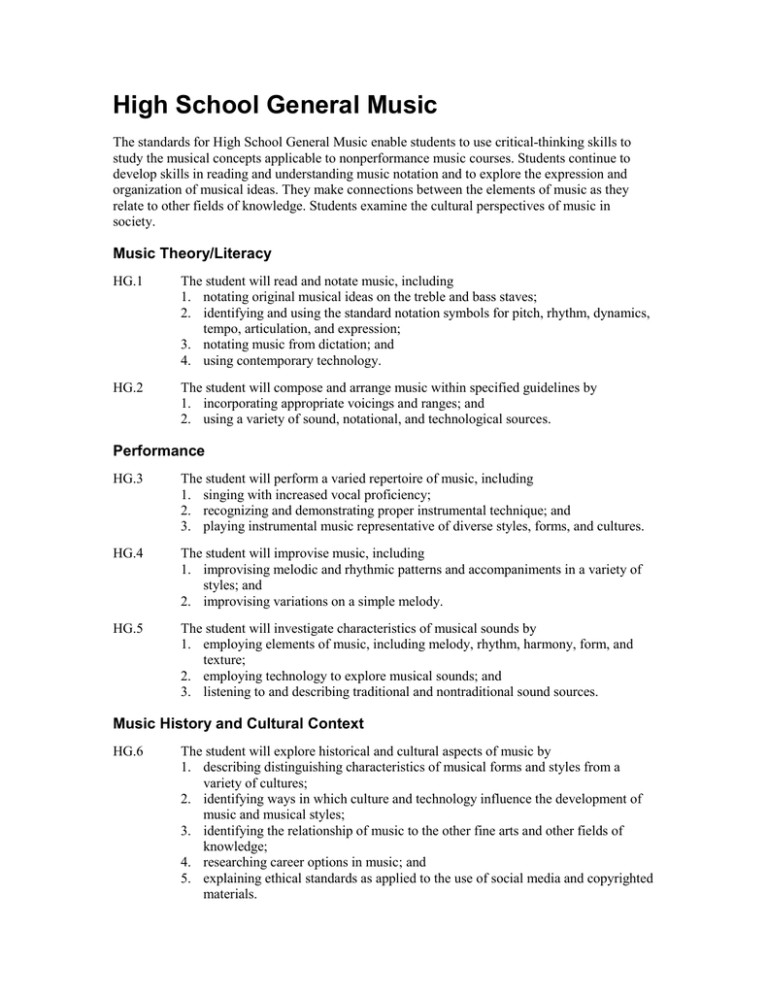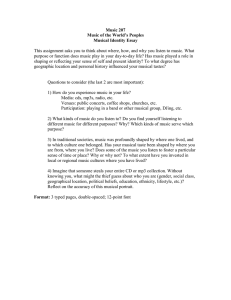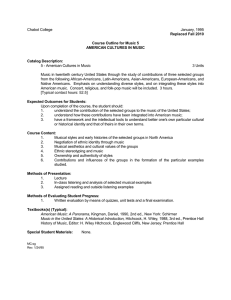High School General Music
advertisement

High School General Music The standards for High School General Music enable students to use critical-thinking skills to study the musical concepts applicable to nonperformance music courses. Students continue to develop skills in reading and understanding music notation and to explore the expression and organization of musical ideas. They make connections between the elements of music as they relate to other fields of knowledge. Students examine the cultural perspectives of music in society. Music Theory/Literacy HG.1 The student will read and notate music, including 1. notating original musical ideas on the treble and bass staves; 2. identifying and using the standard notation symbols for pitch, rhythm, dynamics, tempo, articulation, and expression; 3. notating music from dictation; and 4. using contemporary technology. HG.2 The student will compose and arrange music within specified guidelines by 1. incorporating appropriate voicings and ranges; and 2. using a variety of sound, notational, and technological sources. Performance HG.3 The student will perform a varied repertoire of music, including 1. singing with increased vocal proficiency; 2. recognizing and demonstrating proper instrumental technique; and 3. playing instrumental music representative of diverse styles, forms, and cultures. HG.4 The student will improvise music, including 1. improvising melodic and rhythmic patterns and accompaniments in a variety of styles; and 2. improvising variations on a simple melody. HG.5 The student will investigate characteristics of musical sounds by 1. employing elements of music, including melody, rhythm, harmony, form, and texture; 2. employing technology to explore musical sounds; and 3. listening to and describing traditional and nontraditional sound sources. Music History and Cultural Context HG.6 The student will explore historical and cultural aspects of music by 1. describing distinguishing characteristics of musical forms and styles from a variety of cultures; 2. identifying ways in which culture and technology influence the development of music and musical styles; 3. identifying the relationship of music to the other fine arts and other fields of knowledge; 4. researching career options in music; and 5. explaining ethical standards as applied to the use of social media and copyrighted materials. HG.7 The student will investigate the role of music in society by 1. comparing and contrasting the development of music in diverse cultures throughout history; 2. examining various opportunities to experience music in the community; and 3. describing the role of technology and social media in the development of music. HG.8 The student will demonstrate concert etiquette at musical performances by 1. comparing and contrasting audience behavior appropriate for various musical settings; 2. exhibiting acceptable behavior as an active listener; and 3. showing respect for the contributions of others within performance settings. Analysis, Evaluation, and Critique HG.9 The student will analyze music by 1. describing music styles and forms through listening; 2. defining and classifying various musical styles that represent different historical periods and cultures; 3. examining the importance of composers’ use of style, cultural influences, and historical context for the interpretation of works of music; and 4. describing and interpreting works of music, using inquiry skills and music terminology. HG.10 The student will evaluate and critique music by 1. examining and applying accepted criteria for evaluating works of music; 2. comparing musical performances to similar exemplary models, using music terminology; and 3. examining and applying accepted criteria for critiquing musical performances of self and others. Aesthetics HG.11 The student will investigate aesthetic concepts related to music by 1. explaining how the context of a musical work’s creation may influence its meaning and value; 2. analyzing and justifying personal responses to works of music; 3. examining and applying aesthetic criteria for determining the quality of a musical work; and 4. explaining the value of music to the community and to society.


